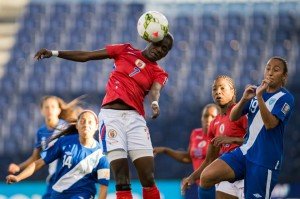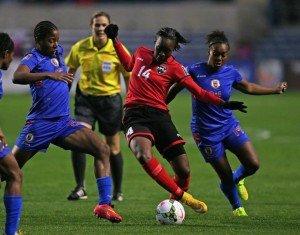By James Louis-Charles, October 23, 2014
Les Grenadières’ World Cup bid for Canada 2015 ended Monday night at the feet of the number 1 team in the World, the U.S. Women’s National Team. The 6-0 score is indicative of how far Haiti will need to go in order to compete among the best in the sport. The question that every Haitian wants to know is, “what now?”

It was well publicized the past few weeks in the American media that the Haitian National team had a difficult journey financially to get to the World Cup Qualifying stage. No one was sure as to what would happen if the team didn’t advance to the World Cup. After donating funds they had crowdsourced from their own team supporters to the Trinidadians who were in difficulty, and after receiving the unsuspecting help of the Clinton Foundation for this gesture, Coach Shek Borkowski indicated at the post-game press conference Monday, that the team will be getting some financial backing from the business community in Haiti as well. Borkowski didn’t name the companies but said he was confident that with the support, he will be able to continue his multi-year plan to get Haiti closer to the 2019 Women World Cup.
The team will take the next few weeks off, and then return to training in preparation for the Central American and Caribbean Games (CAC), which starts next month.
When asked if the team will remain in Indiana Coach Borkowski said yes, that logistically it is better to have the players under his control. In Haiti, factors such as family responsibilities, social pressures, and lack of reliable transportation can prevent players from making practices on time, eating properly, and staying focused on the game. He also mentioned the importance of relying on the Haitian-American players on the team to set an example for the level of professionalism he expects from the Haitian-born players on the team. They have also served a key role as translators communicating changes during games, as his Creole abilities are quite basic.

It is expected that a few players will retire because of their age, and as such the coach plans to bring about 6 to 8 new players from the youth teams in Haiti into the program in Indiana. He has been following these players closely and thinks they could be introduced on the team for the CAC games.
Women’s soccer in Haiti doesn’t get the same kind of support as the men’s program. In fact this is true for all aspects of Haitian life. While women are increasingly taking on leadership roles, the vast majority of women in Haiti are expected first and foremost to meet family expectations of handling household duties and are strongly discouraged to play sports. A successful national women soccer team in Haiti has the capability of addressing many inequalities that women have been dealing with there. One such very important issue is the fact that young girls make-up a higher percentage of restaveks in Haiti. Restaveks are children that are forced into servitude at an early age because their parents cannot afford to take care of them. These children end up being robbed of their childhood, and oftentimes face limited opportunities as adults, as a result. Restaveks are also susceptible to being abused mentally, physically and even sexually. A strong and successful women’s soccer team in Haiti would have the power to address important issues such as this one by providing strong, successful female role models to young girls in Haiti so they too can know they can achieve their dreams, whatever they may be.

There are some talented female players in the U-17 and U-20 ranks that will soon be a fixture on the senior women side. However, the talent pool could be expanded even more if a Haiti-based all-girls soccer academy opened where girls as young as 10 years old could be recruited from around the country to be trained year round while also getting a solid education. It is important for these girls to get an education in the event they can’t make it as soccer players later on, and so they can also become leaders in their community tomorrow.
There is no denying that women soccer in the U.S. is the highest at any level in the world. As such, the coach should continue to do his best to recruit Haitian-American players such as Shanna Nicole, Sam Brand, Lindsay Zullo, and Kim Boulos from the college ranks or higher who could help the team. As the members of the 1974 men team is proof, being a part of the team that qualifies Haiti for a World Cup will guarantee anyone hero status for ever in Haitian history.

The job Coach Borkowski has done so far is very commendable considering the obstacles he has encountered along the way. We will continue to support him and the ladies on the team along their journey to the next Women’s World Cup in 2019.
The importance of the task at hand cannot be understated, which is why we will continue to root for them to succeed at every level.
Ayiti pap peri! Haiti will not fail.













 Home
Home Store
Store Contact
Contact